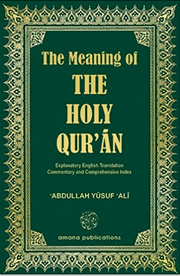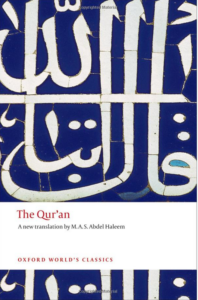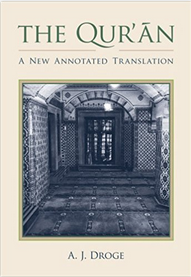Anyone who doesn’t know Arabic faces many obstacles reading the Qur’an. The last thing they need is an archaic translation. Though cheap and popular, Marmaduke Pickthall’s The Meaning of the Glorious Koran: An Explanatory Translation is very archaic, making it hard for modern readers to grasp.  Yusuf Ali’s The Meaning of the Holy Qur’an suffers from archaic speech also, though its Sunni commentary (in the footnotes) can be helpful. A.J. Arberry’s The Koran Interpreted: A Translation remains a scholarly standard in many respects, but archaic English weakens it too.
Yusuf Ali’s The Meaning of the Holy Qur’an suffers from archaic speech also, though its Sunni commentary (in the footnotes) can be helpful. A.J. Arberry’s The Koran Interpreted: A Translation remains a scholarly standard in many respects, but archaic English weakens it too.
Modernization of the Qur’an’s contents is the other major problem in translations, with some recent ones being the worst offenders. When such modernization—or even Christianization—contaminates it, a translation reflects our thinking, not that of the Qur’an. Unfortunately, this problem is as hard for non-Arabic speakers to detect as the first problem is easy.
For example, Q 4:34 tells Muslim men to beat their wives if they suspect them of being unruly. Many translators modernize the word iḍribuhunna (strike or hit them) here. Yusuf Ali’s translation adds the word “lightly” in parenthesis. The problem is that the Arabic text has no such qualifier and most English readers won’t know that. Laleh Bakhtiar’s The Sublime Qur’an goes even further, excising the entire idea of corporal punishment and, so, failing miserably to interpret the Qur’an in context. Though M.A.S. Abdel Haleem’s The Qur’an: A New Translation evidences fine scholarship in many respects, it too is sometimes weakened by a modernizing tendency. At least with Q 4:34, it confines that tendency to a footnote that allows husbands to give their wives a single slap. It’s understandable that  translators want to make this seventh-century command fit current values and, so, make it more pleasing to modern (Western-inspired) sensibilities. But such modernization flies in the face of the hadith, which demonstrate that the first Muslim generations had no precise understanding of the sort of beating advocated.
translators want to make this seventh-century command fit current values and, so, make it more pleasing to modern (Western-inspired) sensibilities. But such modernization flies in the face of the hadith, which demonstrate that the first Muslim generations had no precise understanding of the sort of beating advocated.
For centuries Muslims couldn’t translate the Qur’an. Nowadays new Muslim translations seem to pop up every other day, but most of them exhibit serious modernization. Some non-Muslim translations fail here too.
 My first choice of translation is Alan Jones’s The Qur’an (pictured on the right). Jones gives us a readable translation that avoids modernizing quite consistently. The serious scholar will also want to consult A.J. Droge’s The Qur’an: A New Annotated Translation, a thoroughly researched version, with detailed notes reflecting current Qur’an scholarship. A translation to watch for is Gordon Nickel’s Qur’an with Christian Commentary, to be published by Zondervan later this year.
My first choice of translation is Alan Jones’s The Qur’an (pictured on the right). Jones gives us a readable translation that avoids modernizing quite consistently. The serious scholar will also want to consult A.J. Droge’s The Qur’an: A New Annotated Translation, a thoroughly researched version, with detailed notes reflecting current Qur’an scholarship. A translation to watch for is Gordon Nickel’s Qur’an with Christian Commentary, to be published by Zondervan later this year.
 Even with a solid translation, the Qur’an is hard to understand. Most non-Muslims find its non-chronological order and lack of contextual markers utterly bewildering. So, I strongly encourage you to read the Qur’an in chronological order, along with a guide to its story. Also, consulting a book that compares and contrasts the Qur’an with the Bible is vital, since the Qur’an claims to be the Bible’s sequel. And one challenge we all face is determining how the Muslim scripture agrees with and differs from the Bible.
Even with a solid translation, the Qur’an is hard to understand. Most non-Muslims find its non-chronological order and lack of contextual markers utterly bewildering. So, I strongly encourage you to read the Qur’an in chronological order, along with a guide to its story. Also, consulting a book that compares and contrasts the Qur’an with the Bible is vital, since the Qur’an claims to be the Bible’s sequel. And one challenge we all face is determining how the Muslim scripture agrees with and differs from the Bible.




Yes, I think everyone will agree that virtually no one speaks the Arabic of the Qur’an now, even in Saudi Arabia. For centuries Muslim authorities opposed the translation of the the Qur’an since translation always necessitates interpretation. Nowadays, however, Muslim authorities are happy to permit translation with the proviso that a translation is not the Qur’an itself, but only an interpretation of it.
Insofar as the memorization of the original text retains it’s authenticity, a translated copy would facilitate understanding especially to the non-Arabs. You will bear with me that almost nowhere does a people speak the original Arabic.
I am always puzzled as to why people say the Quran is difficult to understand. For me it is clear and easier to comprehend than the Bible. It can be read chronologically as well as out of order and is still easy to understand, which is just one of its many beautiful attributes. Come to read it with a calm and open spirit and you will discover not only its beauty but its character as well.
To me, Quran cannot be understood through any translation. It is claimed in the book that it is a word of God, so one has to learn the language of the book to grasp the actual meanings and objective. Quran is a miracle if you understand and otherwise if you do not nonetheless, to my experience, if you remain consistent and focus, its meanings start revealing spontenously.
Yes I would highly agree that having come from a Christian background would be a plus in reading the Qur’an. One should read the Bible thoroghly in an acedemic way and then Read the Qur’an. Afterwards it will be absolutely no doubt that the Qur’an is in deed a Divine Miracle.
Thank you! Very informative.
Thank you.
Fantastic blog!